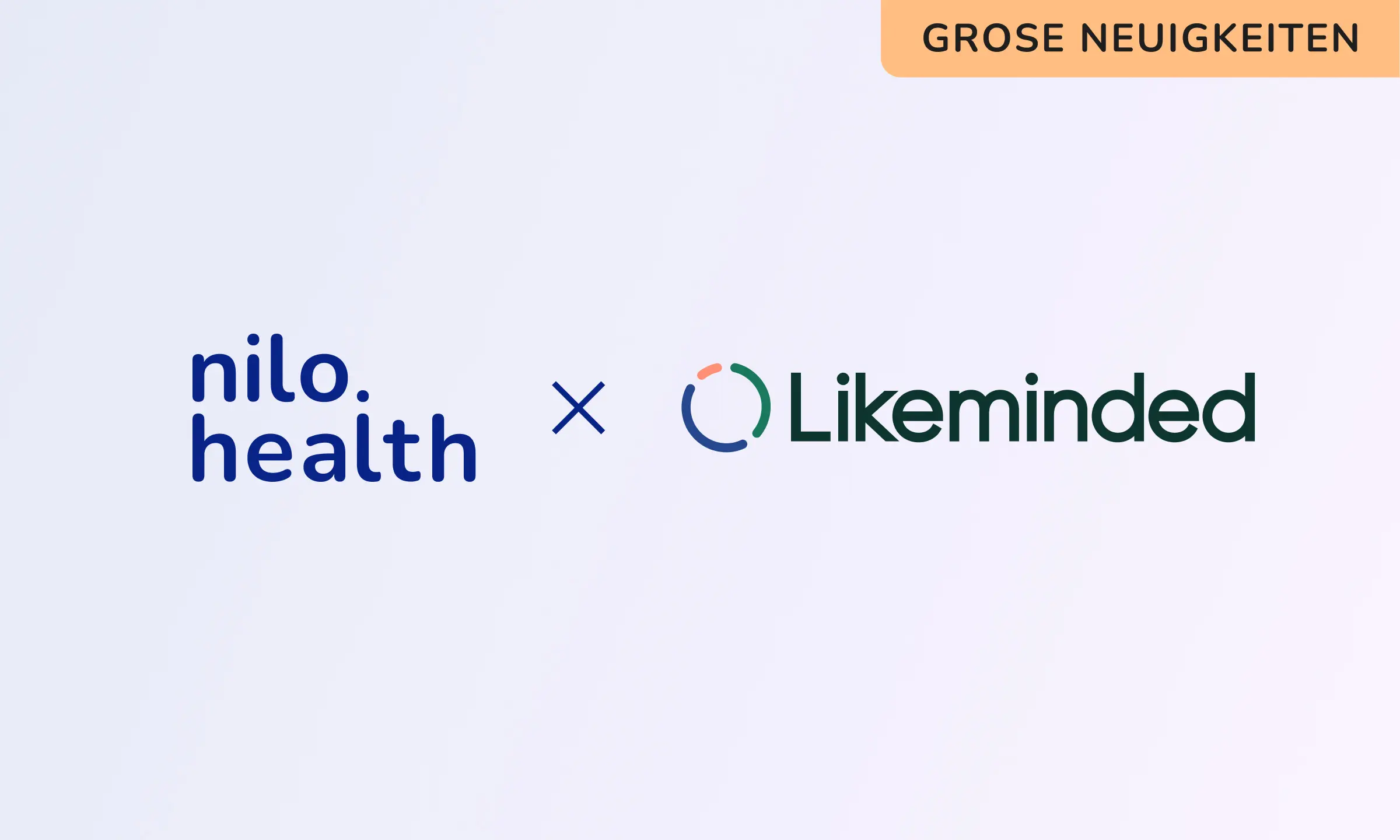The term company culture is both very hyped – and very hazy. Defined as “the personality of an organization from the employee perspective“ – culture is the sum total of the “prevailing values, norms and attitudes that determine decisions, actions and behaviors” within a company.
It may be a buzzword, but company culture is critical: the beating heart of workaday life from the conference room to the kitchen – and the sine qua non for achieving strategic goals as well as retaining and engaging employees. In short: a strong, healthy culture is essential to every company’s growth and innovation. But what does it look like – and how can you build it?
“Well-being comes from one place, and one place only – a positive culture.”
Worldwide, the rates of mental health disorders have been rising steadily over the past decades. In Germany alone, absences due to psychological illnesses have doubled in the last 20 years, making up an increasingly large proportion of sick leave.. The intense pressures and traumatic losses of the COVID-19 pandemic pushed mental health struggles for many around the world to a new level – with the result that employee burnout has reached historic levels.
It’s clear that mentally healthy interactions between employees play a central role in building a positive culture and supporting health and well-being. In an article published in the Harvard Business Review, researchers Emma Seppälä and Kim Cameron identified six behaviors they deem essential to building a positive workplace culture:
Caring for, being interested in, and maintaining responsibility for colleagues as friends.
- Providing support for one another, including offering kindness and compassion when others are struggling.
- Avoiding blame and forgiving mistakes.
- Treating one another with respect, gratitude, trust, and integrity.
On a similar note, Mental Health America’s 2019 Mind the Workplace Report found that “a company culture with safe and open communication is essential to employee engagement and wellbeing”. Yet “safe and open communication” is not often taught in university courses, nor are these skills everyone learns via their career or family – however they can be learned and practiced through therapy and other forms of psychological training and coaching.
The data has spoken: workplace well-being trumps material benefits
The so-called “Great Resignation” has seen record numbers of workers around the world leaving their jobs since the onset of the pandemic, hurtling organizations into a frantic search for new talent – and profound self-searching. A study published in February found that the most common reason cited for quitting during the Great Resignation was toxic company culture. Many have quit for a lower salary or without having a new job: only 55% of respondents reported having a new position lined up – of these, a remarkable 53% reported a salary decrease. This last statistic mirrors the data that led Seppälä and Cameron to the conclusion: “employees prefer workplace well-being to material benefits.”
The authors of the 2021 Mental Health at Work Report study also found that: “Employees need and expect sustainable and mentally healthy workplaces,” maintaining that this “requires taking on the real work of culture change” and that employer initiatives like “mental health days or weeks, four-day workweeks, and enhanced counseling benefits or apps” are simply not enough.
Mental health benefits, such as those offered by nilo.health, operate on both the individual and company level to ensure the essential elements of culture are fostered – every day and over the long term – by giving all employees convenient and ongoing access to mental health professionals and evidence-based psychological trainings. And naturally, we don’t just offer mental health services – we aspire to promote and sustain mental health every day in our own culture.
5 ways nilo.health fosters a mental health-friendly company culture
# 1: Values & norms that have mental health at their core
Drawing on data from two US-based surveys, McKinsey & Company recommend companies ensure workplace norms support mental well-being, urging:
- role-modeling by leaders talking about their own mental health challenges
- investing in trainings to equip all employees with tools to support each other
- fostering workplace community and connectivity
The first two points have been part of nilo.health’s culture and processes from day one. The first one is especially essential, since it’s our way of “walking the talk” of our own services and values. All team leads are urged to lead with openness and vulnerability, showing colleagues by example that it’s ok not to be ok – and even more so: it’s ok to talk about it.
The last point – fostering community and connectivity – we tackle in a range of ways, taking a bottom-up approach:
- We trust our colleagues by default. The very fact you are a nilo team member means your manager believes in you and your abilities 100%.
- Despite the need for different departments, we view the entire organization as ONE team with a collective responsibility to shape our culture and the way we work together.
- We aspire to be a company where everyone feels a sense of responsibility to do the right thing to help the company advance – even if it means disagreeing with your manager. We urge people not to seek to please their boss, rather to seek to serve the business.
- We are caring – communicating and behaving with candor. We respect and treat all genders, skin colors, sexual orientations and social and national backgrounds equally, doing everything in our power to create and maintain an inclusive, psychologically safe space.
- We are courageous. We say what we think, even if it is controversial. Sometimes being courageous also means admitting when you’re wrong or simply feeling weak. We believe our vulnerability makes us strong.
The reality in practice: We see these values as a living, breathing project that will develop as nilo grows and transforms. In the next phase of this process, we will invite the team to review and challenge these points, proposing alternatives and adjustments to further shape and evolve the nilo culture together.
nilo.team voice:
“I remember asking about nilo’s company culture in my first interview and thinking to myself: ‘Sure: as if any start up actually lives up to those standards. After six months in, it’s safe to say – and a bit mindblowing! – that nilo.health actually does!” – Andrea Spiegl, Content Marketing at nilo.health
# 2: Hiring for a culture – & values! – fit
To us “culture fit” doesn’t mean neglecting diversity in perspectives, skills or background in any way, rather it means we strive to hire individuals who share our core values.
Company culture isn’t something you can impose. As per the definition at the start of this piece, it’s the sum total of individual values, norms and attitudes. Hiring people that are already intrinsically aligned with our values means we not only get to work with the wisest, most wholehearted people (if we do say so ourselves), it means that despite a healthy diversity of skills, perspectives and opinions, there’s an unforced harmony of purpose and approach. Speaking of hiring, we’re on the lookout for new team members – check our open positions here.
The reality in practice: Hiring for values fit is not as easy as it sounds: how do you assess values in an interview? How can you measure alignment? Thus far, nilo.health has relied a lot on “gut feelings”, but as we grow, we need a more structured approach. We’re now building a recruitment team to develop and implement the necessary assessment processes. In the meantime, we have focused “culture interviews” for all candidates and our founders remain committed – until we surpass 100 employees – to interviewing every candidate themselves before they join the team.
nilo.team voice:
“I think our mission is a filter in itself for recruiting people with shared values. And it does so much for our team culture: Although we are a team with very diverse backgrounds, interests and needs we share the same values when it comes to being kind, open and transparent in our communication.” – – Dominic, Sales Manager DACH at nilo.health
# 3: Reinforcing company culture through benefits, perks & practice
It’s important to remember that your culture is NOT your benefits and perks. Your benefits will naturally attract certain types of people, however, and thus should accurately reflect your culture.
Here are three examples of how our benefits and perks are an extension of our mental health-promoting company culture:
- Workation: Our employees are free to work outside of Germany for up to 26 weeks annually.
We fully trust them to:
- Ensure no one’s workflow is affected by their absence.
- Be mindful of any time differences and have a working internet connection.
- Put an interim solution in place if their work usually demands in-office presence.
- We also have colleagues who work 100% remotely, for a variety of reasons. We know that giving people the opportunity to decide for themselves which location and time works best for their mental health builds a positive company culture. We are also keen to dismantle the antiquated notion that people are more productive in an office environment than at home – flying in the face of so-called “proximity bias”.
- All our employees can use the nilo.health app to talk 1:1 to therapists online as well as use the self-guided programs to reinforce their mental health “hygiene” and well-being.
The reality in practice: Our app helps the team to reflect on their challenges – whether at work or home – and develop and ingrain core habits and skills such as mindfulness, assertiveness, and active listening, to name a few.
As for workations: what started as a pilot project in January 2022 has already demonstrated its effectiveness in increasing the happiness and loyalty of team members – with some teams even taking Workations together! BUT: connectivity issues and balancing work and travel schedules while visiting exciting new countries DO occasionally pose challenges – we’ve learned it’s important to have a watertight plan in place to ensure both sides of the workation equation get satisfied.
We’re really just at the beginning of developing our benefits offerings. There are many things we want to look into and test going forward, for example: unlimited vacations, dedicated company-wide mental health days and more.
nilo.team voice:
“2021 was a challenging year for me, in many aspects. It also changed my perspective on my priorities, goals and values. In the end, I decided to move back home to Gran Canaria and leave Berlin with all its light and shadows. I don’t only have a job covering my personal needs, but also a project I heartily believe in, a vision I share. I feel really lucky.” – Javier Medina Sosa, Performance Marketing at nilo.health
# 4: Our dedicated mental health committee
Not long ago, we launched a new initiative with the aim to address employee mental health at nilo in a focused and sustained manner: a dedicated mental health committee. The committee consists of employees from different teams and is tasked with fostering the mental health of the entire company, among other things by:
- Evaluating the needs of different teams and, as needed, implementing team-specific mental health initiatives.
- Providing informal support to colleagues
- Ensuring the work environment remains inclusive, and
- Ensuring mental health remains a top priority
As with all our initiatives, we’re taking a bottom-up approach.
The reality in practice: In all transparency, we’re just launching this initiative – it will grow and evolve over time as we figure out what works and what doesn’t. Although kick-started by employees, we’re happy to report that leadership have given their full support to the committee – despite the time and dedication it will doubtless require.
# 5: Team check-ins
After having defined your values, hired the right people and set up benefits and initiatives to foster mental health, the central question still remains: how do your employees REALLY feel about your company culture? Seriously: your company culture is only ever as good as your employees’ experience of it. To this end, at nilo we’ve started conducting regular mental health check-ins to evaluate the effectiveness of putting mental health at the core of our company culture. To get the ball rolling at your organization, you might consider using Amy Edmondson’s short psychological safety assessment survey, one of the most widely-used assessment tools for workplace psychological safety – it’s available in our Corporate Sanity Guide.
Naturally there’s no set formula for building a strong company culture – every company is different and every culture is constantly evolving and responding to both external and internal circumstances. The important thing for leaders is to keep your ear to the ground, listening out for employees’ needs and feedback. And: stay transparent, show vulnerability, and be ready to get proactive and creative. Your success depends upon it. It’s that simple.






